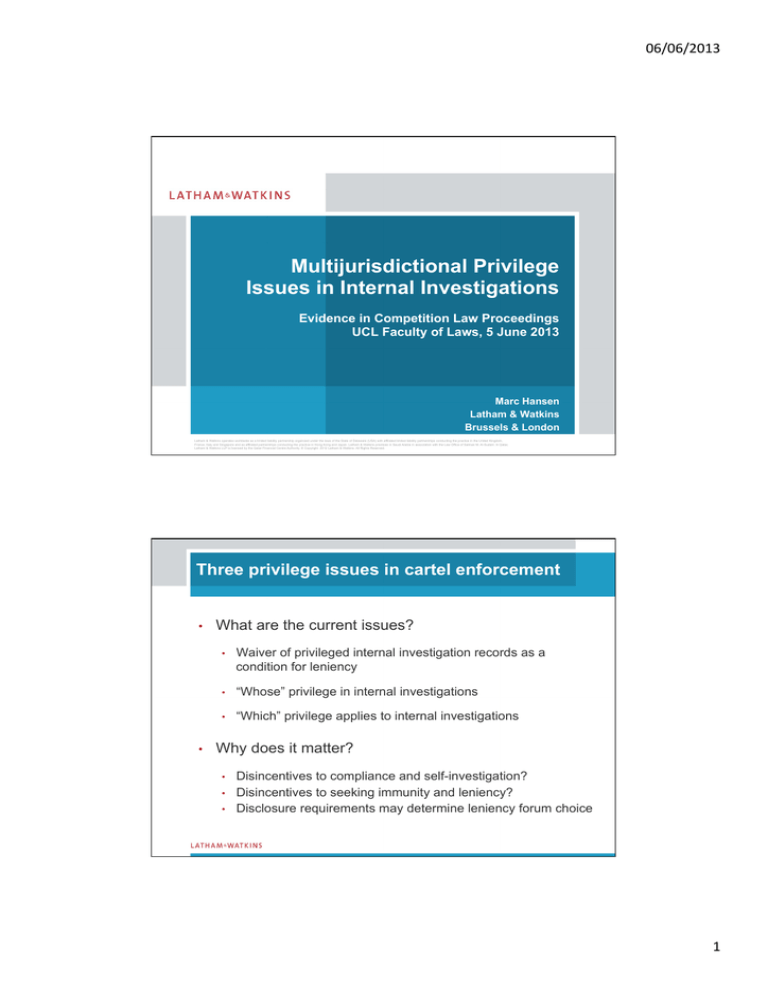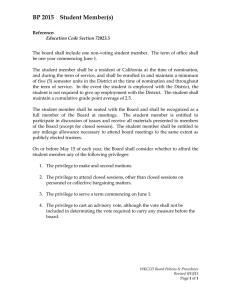
06/06/2013 Multijurisdictional Privilege
Issues in Internal Investigations
Evidence in Competition Law Proceedings
UCL Faculty of Laws, 5 June 2013
Marc Hansen
Latham & Watkins
Brussels & London
Latham & Watkins operates worldwide as a limited liability partnership organized under the laws of the State of Delaware (USA) with affiliated limited liability partnerships conducting the practice in the United Kingdom,
France, Italy and Singapore and as affiliated partnerships conducting the practice in Hong Kong and Japan. Latham & Watkins practices in Saudi Arabia in association with the Law Office of Salman M. Al-Sudairi. In Qatar,
Latham & Watkins LLP is licensed by the Qatar Financial Centre Authority. © Copyright 2012 Latham & Watkins. All Rights Reserved.
Three privilege issues in cartel enforcement
•
•
What are the current issues?
•
Waiver of privileged internal investigation records as a
condition for leniency
•
“Whose” privilege in internal investigations
•
“Which” privilege applies to internal investigations
Why does it matter?
•
•
•
Disincentives to compliance and self-investigation?
Disincentives to seeking immunity and leniency?
Disclosure requirements may determine leniency forum choice
1 06/06/2013 Waiver of LPP – Internal investigation records
•
What cooperation is required from leniency applicant?
•
•
•
UK criminal enforcement procedure
•
•
•
•
Providing evidence and facts; making available witnesses
Until recently, no jurisdiction required leniency applicant to turn over
privileged records of internal investigation
Duty to disclose “unused material” to defendant that might assist its
case or undermine the OFT’s case (BA/Virgin; Condor Review)
OFT seeks interview records from leniency applicant for transmission
to defendant (“assisting case of the accused”; Sect. 3 CPIA 1996)
Is it “witness account material” or privileged
Practice caused significant concern
•
•
•
•
Inconsistent with practice of other global authorities; So far UK is on its own
DOJ, EU, ACCC & Bureau against disclosure of internal investigation results
Incompatible with “corporate statement” based enforcement systems
Disincentive to cooperate: Waiver of privilege leads is complete (subjectmatter waiver in US) and evidence discoverable in US class actions
Solution to UK waiver requirement?
•
Considerable debate over the past three years
•
•
•
•
In international cases, there is friction with other authorities
Waiver risk operates as disincentive to cooperating with OFT
Two consultations to seek solutions
What solutions?
•
•
•
Problem arose out of two party case; “he said, she said” and credibility
Solutions should be proportionate to real issues
What has been proposed?
•
•
•
•
•
•
Waiver when case is before court or pre-charge investigative state (waiver)
Disclosure of unused material to Independent Counsel (waiver in US law)
Limited waiver (but subject matter waiver under US LPP doctrine)
Very limited investigation by applicant (is that practical w. EU and DOJ?)
Applicant proffers on “no exculpatory evidence” in their possession
Obtaining court order (in camera review and protective orders; Permian on
voluntary waiver)
2 06/06/2013 “Whose” privilege in internal investigations
•
Internal investigations in competition case:
•
•
•
US practice – Upjohn warning
•
•
A company seeking to determine competition law violation
through interviews with employees
Who is the client and what privilege applies?
Bias in favor of corporation’s privilege; broad interpretation of
the client to include the employees
UK situation
•
•
Owen J in R v. George (citing Three Rivers No. 5) – narrow
definition of the client (excludes the employees)
Fall back on litigation privilege? But is it adversarial at that
stage? (Tesco)
“Which” privilege in internal investigations
•
Privilege means different things to different people
•
US : Attorney-Client v. Attorney Work Product Privilege
•
Attorney-client privilege is an absolute privilege unless waived
•
Work product doctrine in anticipation of litigation
•
•
•
•
•
•
Waivers re some communications, waives all (subject matter)
Legal advice privilege can be narrow (Three Rivers)
Litigation privilege only where adversarial (Tesco)
Australia: Litigation privilege may kick in late
•
•
Judged on balance of interests when asserted
No other source for information without undue hardship
UK : Legal advice privilege v. litigation privilege
•
•
Elements include advice sought and given; in confidence
Litigation “contemplated” just before court proceeding (ACCC v Prysmian)
Compare AM&S: “earlier written communications” (recital 23)
3 06/06/2013 What is the net outcome?
•
Legal privilege should be treated with care
•
•
Leniency relies predictable cost/benefit analyses
and perceptions as to how procedures operate
•
•
Break it and it cannot be put back together
Upset the perception, and incentives to cooperate may dry up
Corporate internal investigations are the motor of
any corporate leniency policy
•
Facilitate them; There are other ways to protect the rights of
defence – such as exhaustive investigations by enforcers
Further information on this:
•
Challenges to International Cartel Enforcement and Multi-Jurisdictional Leniency Applications
(Vancouver DOJ/ABA/IBA, Jan 2012; OECD 11th Global Forum on Competition, Feb 2012)
•
http://www.lw.com/presentations/challenges-to-international-cartel-enforcement
•
Procedural and Substantive Conflicts in Multi-Jurisdictional Cartel Investigations
•
http://www.lw.com/presentations/multi-jurisdictional-cartel-investigations
•
Latham & Watkins Response to the OFT's Supplementary Consultation on Applications for
Leniency and No-action in Cartel Cases
•
http://www.lw.com/thoughtLeadership/applications-leniency-no-action-cartel-cases
•
Marc Hansen
LATHAM & WATKINS LLP
Boulevard du Regent 43-44
1000 Brussels
Tel: +32 2 788 6000
Dir: +32 2 788 6301
Cell Phone: +44 7876 506 990
Email: marc.hansen@lw.com
LATHAM & WATKINS
99 Bishopsgate
London EC2M 3XF
Tel: +44 20 7710 1000
Dir: +44 20 7710 1094
4



